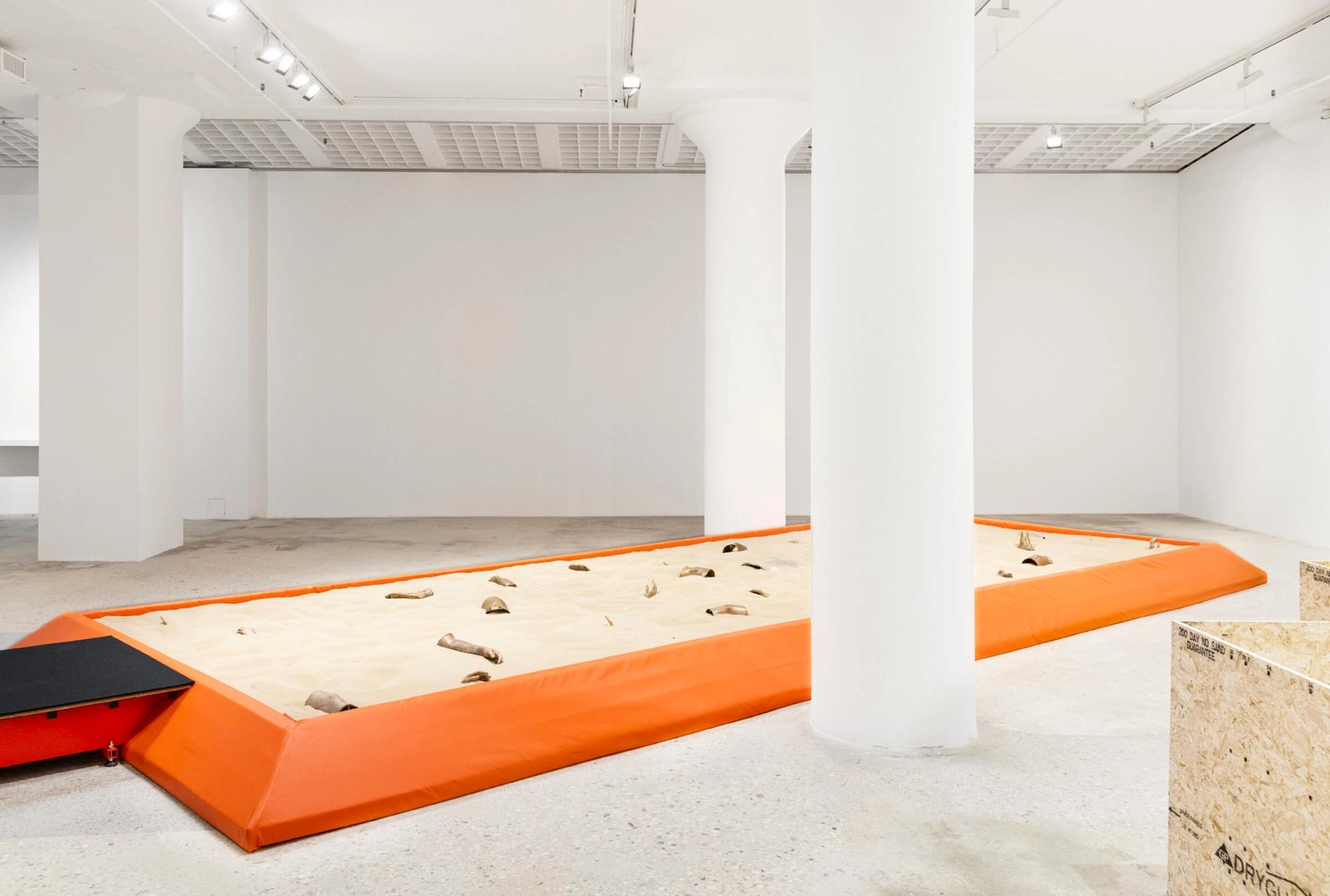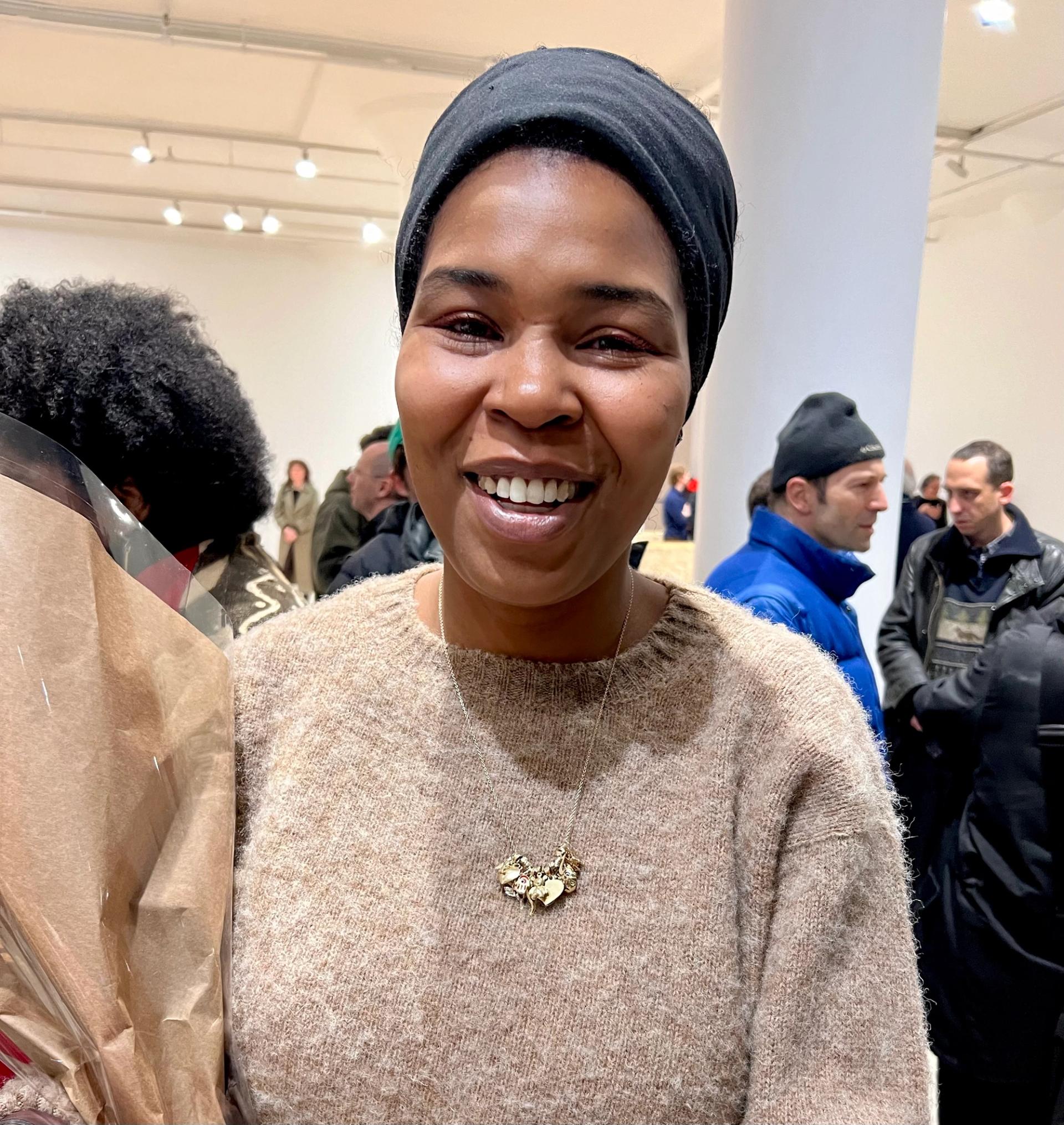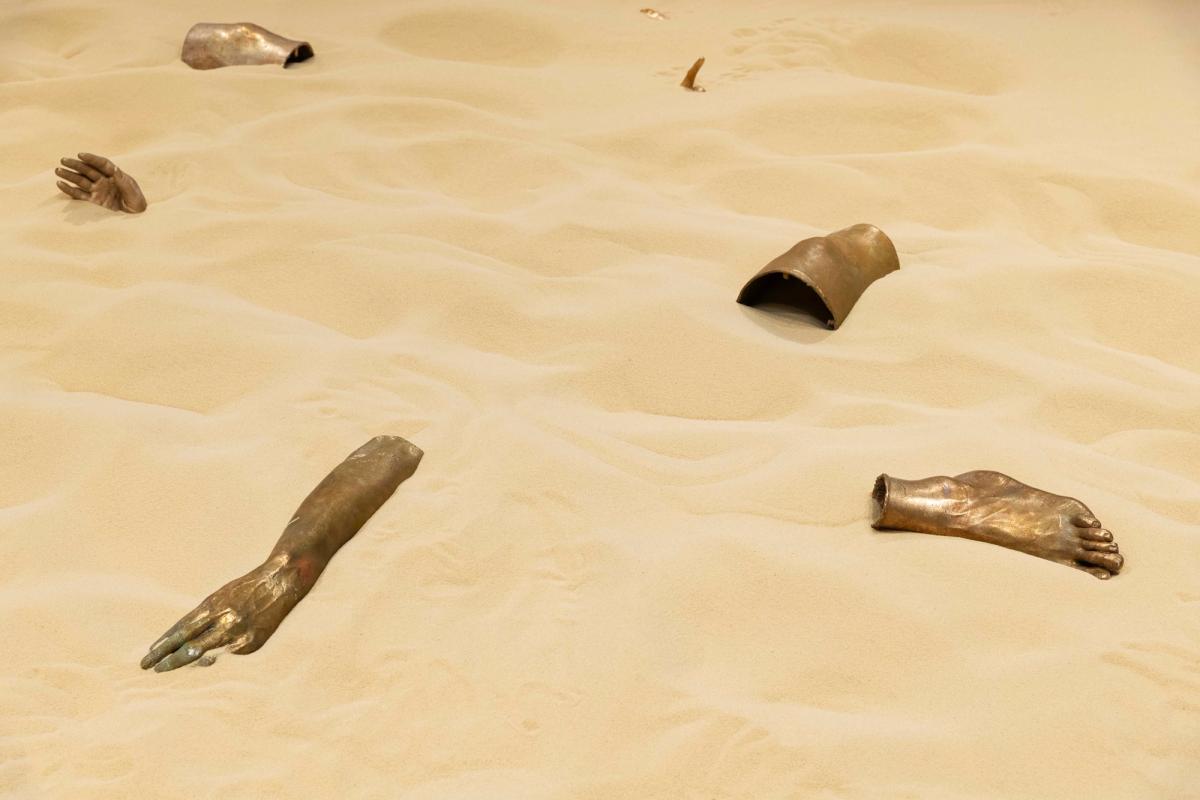There is no containing Diamond Stingily. The irrepressible, 33-year-old New York transplant from Chicago identifies as a writer but also makes visual art and performs on screens large and small as if born to each discipline. With Sand, her first exhibition at Greene Naftali gallery, Stingily takes another leap—into track and field.
The long jump is to Stingily what basketball is to David Hammons and football is to Matthew Barney: a metaphor for striving. Viewers unfamiliar with the Olympic sport may be mystified by the presence of an actual jump apparatus. Its 52ft length, including a runway and a ginormous sand pit wrapped in Safety Orange plastic, splices the gallery in two, blocking easy passage through the space. Additionally, a locked, chain-link gate that closes off a private room set up for a funeral service allows peeking while inhibiting further movement. “I like restriction,” Stingily says. “It’s a pattern in my work: you can only go so far.”
That was clear to such opening night guests as the Dia Foundation’s Donna de Salvo, the Sculpture Center’s Sohrab Mohebbi and the Art Basel director Maike Cruse, who were forced to circumnavigate the jump in small groups and contemplate three awkwardly placed chipboard crates of more sand, each built to resemble a sarcophagus and bearing the stencilled words “NO SAND”.

Diamond Stingily, Installation view, Sand, Greene Naftali, New York, 2023
Courtesy of Greene Naftali
Given its ungainly layout, stark lighting and extreme subjectivity, Sand may be inscrutable to visitors who pass through what initially appears to be a construction site. In fact, it faithfully represents Stingily’s state of mind when she conceptualised the show in 2021, a year that took the lives of her mother, Sand, (short for Sandra) and her grandmother. It also sent Stingily to the hospital for a foot surgery that immobilised the 6ft 1in artist for months. “I was under construction,” Stingily declares. The show, she adds, is not just her way of moving past grief. “It’s about the present. And the things we leave behind.”
Stingily alludes to some of those things with a multiplicity of cast bronze hands and feet that she scattered across the sand pit. In competition, it promises jumpers a soft landing, while Stingily has turned it into a zone of immobility and anguish. The scene reminded me of bodies fossilised by the volcanic ash of Pompeii. At the same time, it remained a sandbox. A place to play.
And Stingily is a player, an artist to reckon with and an entertainer who has been discovering herself since she quit Columbia College as a creative nonfiction major in 2014, when the artists Puppies Puppies (Jade Kuriki-Olivo) and Forrest Nash read some of her journal writing. They encouraged her to make it visual in the display window of Egg, a project space they founded in Chicago.
The resulting mise-en-scène had all the trappings of Stingily’s imagined funeral, including her obituary, though she conceived the exhibition as a farewell at a moment when she badly wanted to leave Chicago. No sooner did it go on view than her fellow Chicagoan artist Martine Syms offered to bring her to New York to appear in Notes on Gesture, a propulsive video on symbolic language that garnered wide attention in Syms’s New York debut at Bridget Donahue Gallery. It put Stingily’s face on the front page of The New York Times arts section. She never returned to Chicago.

Diamond Stingily at the opening of Sand at Greene Naftali
Photo: Linda Yablonsky
Since then, Stingily has gone full bore into comic acting, zine publishing and serious art-making. In 2018, she played a featured role in an episode of Terence Nance’s HBO series, Random Acts of Flyness. Two years ago, she starred as Palace in The African Desperate, Syms’s hilarious art-school satire and first feature film.
Meanwhile, Stingily’s evocative sculptural installations won over critics and viewers for her participation in no less than three thematic surveys at the New Museum as well for solo outings at Isabella Bortolozzi (Berlin), the now-defunct Queer Thoughts (Tribeca), the ICA Miami, the CCA Wattis Institute for Contemporary Arts in San Francisco, and the Kunstverein Munich. To cap it all off, over the last year New York’s Museum of Modern Art (MoMA) has prominently displayed her Entryways (2021)—three battered doors from Chicago homes, each with a baseball bat propped against it—in its contemporary collection.
“I’m still processing that,” Stingily says, reflecting on MoMA’s acquisition. “I feel like I’ve accomplished a feat that artists who have been working longer have not. At the same time, I work my ass off! So, why not?”
• Diamond Stingily: Sand, until 20 January, Greene Naftali Gallery, New York


